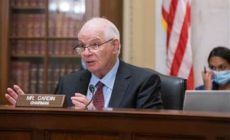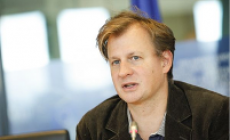Boris Johnson appointed as Britain’s Foreign Secretary: what does it mean for Ukraine?
 On 13 July, 2016 Great Britain’s new Prime Minister Theresa May appointed Boris Johnson as Britain’s new Foreign Secretary. This was seen as a rather controversial move, as Mr. Johnson was a leading advocate for the ‘Brexit’ decision. Moreover, according to reports, Mr. Johnson is one of the most worst qualified people to serve as Britain’s Foreign Secretary. And he has notably made several poor statements on leaders throughout the world, thus questioning his ability as a diplomat. What are the implications of his appointment? And how will this affect Ukraine’s bid for EU membership?
On 13 July, 2016 Great Britain’s new Prime Minister Theresa May appointed Boris Johnson as Britain’s new Foreign Secretary. This was seen as a rather controversial move, as Mr. Johnson was a leading advocate for the ‘Brexit’ decision. Moreover, according to reports, Mr. Johnson is one of the most worst qualified people to serve as Britain’s Foreign Secretary. And he has notably made several poor statements on leaders throughout the world, thus questioning his ability as a diplomat. What are the implications of his appointment? And how will this affect Ukraine’s bid for EU membership?
Who is Boris Johnson?
Boris Johnson, who formerly served as the mayor of London, was a “surprise choice as Britain’s chief diplomat.” Just two weeks before his appointment Prime Minister May “mocked his negotiating skills,” this it is rather why he was selected for the position. As a result, his appointment shocked people throughout the world. For example, reporters in the United States wrote that Mr. Johnson “is known for his deliberately provocative manner” while Ralf Stegner, deputy leader of Germany’s SPD party stated that “Mr. Johnson had hardly demonstrated that he was an outstanding diplomat.” In addition, when questioned about Mr. Johnson’s manner, Turkish Prime Minister Binali Yildirim said “[m]ay God help him and reform him.”
Based on these world statements, Mr. Johnson is not well liked in the international community. In other words, the “[i]nternational reaction to the appointment of Boris Johnson … has been overwhelmingly negative.” In addition, Mr. Johnson is seen as very untrustworthy within the British community. He is viewed as someone who lies, and whose ego “brought about Britain’s disastrous EU exit.”
Mr. Johnson has also made numerous negative statements about various world leaders in the past. And he has shown many traits that demonstrate that he is not very diplomatic. For example, Mr. Johnson has often referred to US President Barack Obama as the “Part-Kenyan President” and as someone who has an “ancestral dislike of [Britain]” while also calling Hillary Clinton “a sadistic nurse.” Mr. Johnson also wrote a poem where it was implied that Turkish President Recep Tayyip Erdogan had sexual relations with a goat, while also stating that Africans are “flag-waving pickaninnies.” Furthermore, Mr. Johnson compared the “European Union to Nazi Germany.” Therefore, given his various gaffes over the past decade it is unsurprising that the international community does not favor him well. In other words, as one EU diplomat put it, “[e]xpectations from [Johnson] are very low based on his track record so far.”
On the other hand, despite much of the negative criticism that Mr. Johnson has received, he also has many supporters. For instance, people who support Mr. Johnson argue that he is “at heart a liberal internationalist … [and] is a polymath who studied at Eton and Oxford,” and is fluent in three languages, thus making him well suited for the position. In addition, while serving as London’s mayor from 2008 to 2016 he was well liked by the electorate. For example, while serving as the mayor of London he improved the public transportation system in London. Furthermore, he was able to lead a successful Olympic games in London in 2012. And perhaps most importantly, Mr. Johnson remains very popular in the Conservative Party.
Implications for Ukraine
Foreign Secretary Boris Johnson does not have a good track record with Ukraine. In May 2016, following the two years anniversary of the conflict that began in Donbas in April 2014, Mr. Johnson stated that it was the EU’s fault, rather than Russian aggression, that led to the conflict. During his remarks, Mr. Johnson argued that the EU was meddling in the affairs of other countries, which further supported his platform of Britain leaving the EU.
As expected, his comments were marked with much criticism. “Britain Stronger in Europe spokesman James McGrory” referred to Johnson as a “Putin-apologist.” Former Swedish Prime Minister Carl Bildt stated that Johnson was “ignorant of the facts on Ukraine.” Other representatives from Sweden, Belgium, and Poland also commented on Mr. Johnson’s remarks, where they further stated that Mr. Johnson had been consumed by the Russian rhetoric.
It is statements such as these that led to the British vote of ‘Brexit.’ Now, while Ukraine is still paving the way to join the EU, Great Britain is seeking a way to exit. This does not help the Ukrainian cause. In addition, Britain is one of Ukraine’s largest advocates for membership, though it now seems that Ukraine’s bid for EU integration may now become more complicated. (The possibility of EU exit referendums in France and the Netherlands does not help either).
As a result, given that Mr. Johnson was recently named as Britain’s Foreign Secretary, it is heavily advised that delegates from Ukraine meet with Mr. Johnson in order to inform him of what is actually occurring in Ukraine. Otherwise, if Mr. Johnson continues to present these nonfactual statements, this will distance the relationship between Great Britain and Ukraine.
Implications for Russia
Mr. Johnson’s comments on the EU’s involvement in Ukraine, as well as his successful ‘Brexit’ platform, are a major victory for Russian President Vladimir Putin. First, by Britain voting to leave the EU, this has sent the organization into an identity crisis, thus weakening it in the process. Second, Mr. Johnson called for the EU to stop meddling in the affairs of various regions of the world, citing that the EU was responsible for events that occurred in Croatia, Bosnia and Herzegovina, and Ukraine. As a result, given recent developments it is likely that the EU will take a less active role towards Ukrainian EU membership. And with the constant discussion of the possibility that Russian sanctions will be lifted, these developments are working in Russia’s favor.
To provide an example of how the Russian Federation views Mr. John, Radio Free Europe radio Liberty reported that the “surprise appointment of Boris Johnson to head the British Foreign Office is being cautiously welcomed by Moscow.” It is believed that Mr. Johnson will work more closely with Russia than former Prime Minister David Cameron’s administration had, as the former’s cabinet largely favored Russian sanctions. “Putin might also be hoping the appointment of the controversial figure … could play into the Kremlin’s hands by creating rifts in the West.” And, perhaps most notably, many Russian politicians hailed the success of Mr. John’s ‘Brexit’ campaign. Many of these officials also believe that Mr. Johnson will also cease the continuation of an anti-Russian rhetoric in Britain. This is because, in the past, Mr. Johnson has called for Europe to “set aside [its] Cold War mindset” and that Britain, as well as the European continent, should be more open towards working with Russia in order to resolve various issues throughout the globe, such as the Syria conflict and the fight against ISIS.
Concluding thoughts
Overall, it can be stated that Mr. Johnson has a poor choice of words, is not very diplomatic, and does not have much experience in the area of foreign affairs. Thus it is understandable why the international community was shocked by his appointment as Britain’s new Foreign Secretary under Prime Minister May. Nonetheless, the world must accept these changes, as well as Britain’s recent decision to leave the EU.
It is also heavily advised that, given Mr. Johnson’s unfortunate statements regarding Ukraine in the past, that Ukrainian delegates meet with him during the second half of 2016. By adopting this strategy, Ukraine can assure that it will not lose one of its most important allies, and in return, will continue to receive support from Great Britain.
Конгрес має надати фінансову підтримку Україні

Бен Кардін
Сенатор Кардін заявив, що у той час, як багато американських сімей в родинному колі святкували День подяки, ук
Україна, ЄС: окремі результати дії зони вільної торгівлі

Модератор групи Geostrategy Сергій Даниленко
Українські виробники активно використовують преференції в рамках торгівлі між Україною та ЄС. Наприкінці 2016 року вже повністю використано 11 тарифних квот:
Газпром не проводить в Європі антисланцеві кампанії

Карл ШЛІТЕР, депутат Європейського парламенту від Швеції
Карл ШЛІТЕР (Carl Schlyter), депутат Європейського Парламенту від Швеції, Група «Зелені» \ Європейський вільний альянс», автор Резолюції Європейського Парламенту щодо екологічних наслідків видобутку сланцевого газу.
